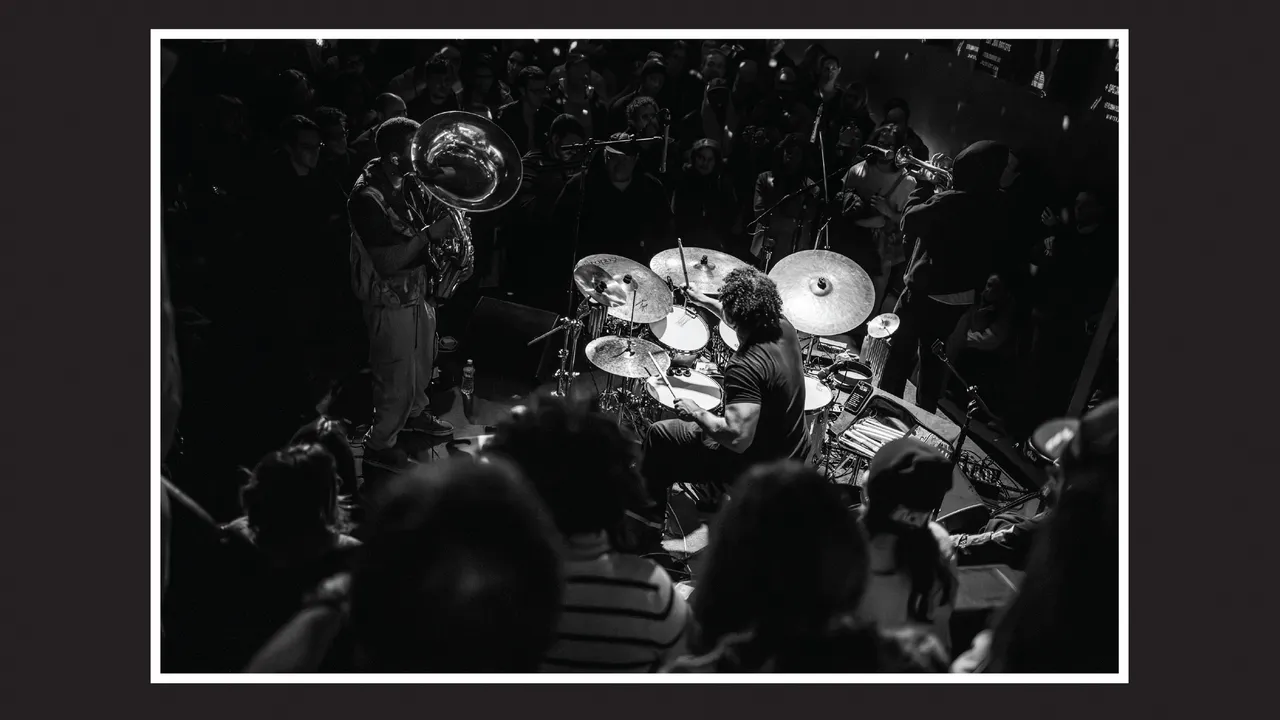Copyright Pitchfork

Makaya McCraven’s music is a process of transmutation: In his hands, improvisation turns into composition and then back again. Like most brilliant ideas, it’s simple to explain and devilishly difficult to pull off. McCraven plays live with one of his groups, usually consisting of some of the best musicians of his generation. Then, he meticulously edits recordings of those performances into new songs, bringing a dexterous hip-hop production technique into the world of jazz. When he tours, McCraven arranges that material for the band to develop further. None of the constituent parts of this model are particularly novel—Teo Macero pioneered the studio-as-jazz-instrument in the 1960s, with Miles Davis—but it’s only possible with McCraven’s inimitable combination of a jazz drummer’s soul and a hip-hop producer’s mind. Off the Record, a collection of four new EPs that have also been released separately, is a useful introduction to McCraven’s evolution since his landmark 2015 album In the Moment, when he began his experiment in jazz/hip-hop hybridization. Rather than a chronological narrative of the growth of the artist, the new set presents a composite portrait: Turn from one EP to the other and you see a wholly different facet of McCraven’s identity, from deft percussionist to bold beatmaker. Much of the variety comes from his choice of collaborators, who range from veteran guitarist Jeff Parker to eclectic folklorist Ben LaMar Gay. The shared characteristic that unites all four releases, though, is McCraven’s uncanny ability to alchemize hip-hop from jazz, structure from freedom, a collective effort into a singular vision. The first words on PopUp Shop, which is drawn from a 2015 concert in Venice, California, come from McCraven: “We’re about to be makin’ some stuff up right here on the spot. This is improvised music. Spontaneous composition.” That’s true for his audience that night, but not for us. The next track, “Venice,” is obviously spliced and reworked, with tight loops built from McCraven’s drums and Benjamin Shepherd’s bass. This Dilla-inspired beat doesn’t change much, serving mainly to highlight a blistering Parker guitar solo. Elsewhere on the four-song set, as on album highlight “Imafan,” McCraven retains the live feel by allowing Justin Thomas’ vibraphone free rein—until sections suddenly begin repeating, revealing his subtle manipulations. The liberatory lift at the end of this song, like a sunflower unfolding, comes from Thomas’ melodic sensibility. McCraven, though, extends the moment for as long as possible after the fact. These edits were made quickly on the day after the show, but they show off the fundamentals of McCraven’s process, demonstrating that In the Moment was not a one-off success but the proof of concept for a generative mode of composition. Hidden Out! also derives from one night, this time a 2017 show at Chicago’s Hideout with Parker and bassist Junius Paul (one track, “Awaze,” swaps Parker for trumpet player Marquis Hill and saxophonist Josh Johnson, from a separate set a week before). Rather than a day of edits, however, these songs underwent eight years of on-and-off tinkering, which may explain their relative seamlessness. “News Feed,” for example, begins with crowd noise and then develops as if everyone in that room witnessed the song’s moody drama, like the live soundtrack to a noir film. But then you realize that there was no vibraphone on stage—that element was overdubbed. Moments like this occur everywhere, from the dreamy haze of “Away” to the muscular funk of “Dark Parks,” each one a testament to McCraven’s patient craftsmanship, his ability to maintain a mood while pushing it, subtly, in a new direction. The outlier here is Techno Logic, the only EP recorded at several concerts across many years, from 2017 to 2025. These tracks stand out stylistically, too, because of the deep, resonant low end of Theon Cross’ tuba and the irresistible charm of Ben LaMar Gay, the only musician on Off the Record capable of stealing the show entirely. Wisely, McCraven lets him. On “Gnu Blue,” Gay chants a wordless mantra that flows over a busy, bassy rhythm, effortless compared to Cross and McCraven’s frantic pace. The rhythm section’s purpose on “Technology” is to simulate a digital breakdown with lumbering tuba blasts and crashing percussion while Gay delivers their mission statement: “Many, many, many years behind what we’ve got already/It’s called technology.” Gay’s most remarkable contribution, though, is not through vocals but the diddley bow, an instrument made with wire, two nails, a wooden board and a beer bottle. As if to prove his thesis from “Technology,” Gay manages to make this simplest of instruments the centerpiece of “Strikes Again” with a driving, repeating figure that brings the traditional blues into McCraven’s ultra-modern project. The latest EP is The People’s Mixtape, featuring a quintet of Paul on bass, Hill on trumpet, Joel Ross on vibraphone, and Jeremiah Chiu on synth, recorded in January, 2025 at Brooklyn’s Public Records. The band is tighter than ever, or McCraven’s editing is more precise, or likely a combination of the two. On a track like the relentlessly propulsive “The Beat Up,” it would be impressive either way; the song dances forward in a dazzlingly intricate rhythm until a fierce solo from Hill urges everyone on, ever faster. The pace rarely lets up, even on seemingly laid-back tracks like closer “Lake Shore Drive Five,” where an atmospheric synth slowly rolls forward until finding traction in a vibraphone and percussion groove. Then, like coasting down the highway after leaving the congestion of the city, the group speeds onward with exhilarating freedom and purpose. At the end of the song, you can hear the audience suddenly appear again, as if McCraven is reminding us that for all his skill as a producer, this is where his music originates each and every time: in a room with other people, exultantly finding their way forward together. All products featured on Pitchfork are independently selected by our editors. However, when you buy something through our retail links, we may earn an affiliate commission.



